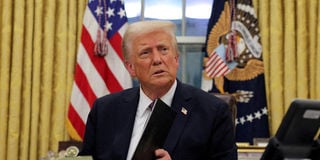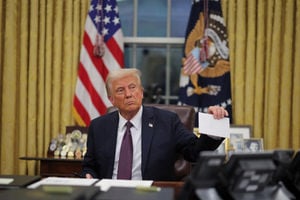
US President Donald Trump signs documents as he issues executive orders and pardons for Jan. 6 defendants in the Oval Office at the White House on Inauguration Day in Washington, US, January 20, 2025.
By giving Donald Trump a second term, American citizens may have voted for the return of two archaic and counterproductive policies.
The first one is mercantilism, an old ideology in which nations sought to accumulate as much wealth as possible at the expense of their neighbours.
They levied tariffs on goods from other countries and went to great lengths to minimise imports so as to accumulate trade surpluses.
This ideology was historically applied by the UK and France to monopolise world trade.
Trump’s proposed package of tariffs looks like a 21st century form of modern mercantilism. He plans to increase tariffs on Chinese goods in a bid to counter the rise of China.
Such protectionist policies have hardly found space in public policy ever since British economist David Ricardo proposed his famous theory of comparative advantage in which he stated, justifiably, that if countries concentrated on producing what they were good at and traded openly with each other, everyone would be better off.
Protectionism has mainly been relegated to the fledgling nascent industries of third world countries. But even there it has not borne much fruit.
The second policy is the old American idea of manifest destiny. In the 19th century, American settlers believed that they had a right to expand westward across North America.
Perhaps that is where Trump’s idea to use the military to seize the Panama Canal originated. Whether or not the canal is being administered by Chinese soldiers as the newly elected president claims, such a move would amount to a serious breach of international law.
As if that is not enough, Trump will also force Denmark to sell Greenland to the US and change the name of the Gulf of Mexico to the Gulf of America.
Moreover, he calls their boundary with Canada, ‘an artificially drawn line.’
The US remains the dominant world power. Trump should, therefore, spare the world his stubbornly insular policies wrapped in his ‘America First’ rhetoric. Apart from causing inflation locally, they would also deliver a shock therapy to the world economy.
Mr Reyia is an economist. joelkapante@gmail.com







